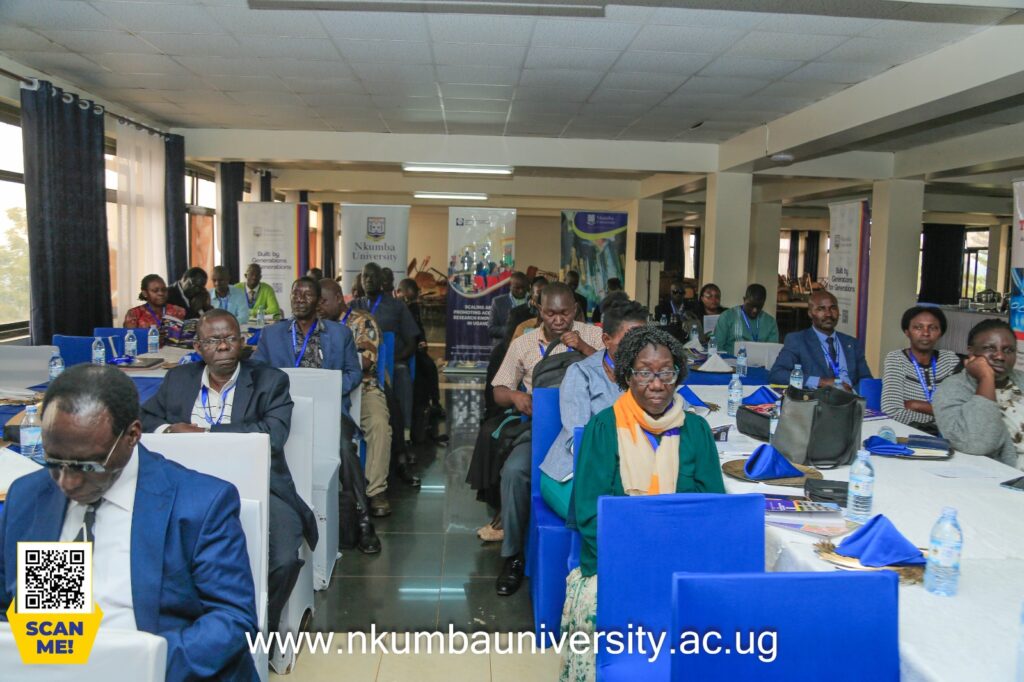The Executive Secretary of the Uganda National Council for Science and Technology (UNCST), Dr. Martin Patrick Ongol, has urged PhD researchers to ensure their work translates into practical solutions that transform communities, the economy, and the nation.
Dr. Ongol said this on Thursday, 21st August, while delivering the keynote address at the Nkumba University International PhD Research Conference, Dr. Ongol described the gathering as timely and thought-provoking under the theme “Ideas in Action: Translating Research into Real-World Impact.”
“It is a great honor and privilege to be part of Nkumba University’s annual PhD conference,” Dr. Ongol said. “This conference celebrates not only the generation of knowledge but also knowledge that makes a meaningful difference in our communities, our economy, and our nation.”
Introducing himself, Dr. Ongol noted that he joined UNCST in 2020 during the COVID-19 pandemic, having previously worked in Rwanda for a decade and later with the UK government as a science and security advisor. He stressed that his current focus lies in science policy, research administration, and community impact.
According to him, a doctoral degree is not just about acquiring a title but about cultivating the ability to generate new knowledge, address pressing problems, and drive innovations that are both locally relevant and globally competitive.
“Universities are laboratories of ideas where hypotheses are tested and theories are built. But ideas alone are not enough; they must be mobilized, translated, and embedded into real-world solutions,” he emphasized.
At UNCST, Dr. Ongol explained, research is constantly evaluated against one profound question: “How does this research change lives?” He pointed to evidence from across the world showing that science is a driver of economic growth, social transformation, and environmental stability.
“From agricultural innovations that enhance food security, to public health research that saves lives, and technology breakthroughs that create industries, research shapes development pathways,” he said.
He tied his remarks to Uganda’s National Development Plan IV (NDP IV), which targets transforming the economy from $50 billion to $500 billion by 2040. Science, technology and innovation, he said, are among the four main pillars of this transformation alongside industrialization, tourism, and mining and manufacturing.
“Science is a productive sector. It cuts across all programs of the national plan. Whether you are in the humanities, anthropology, or hard sciences, research must contribute to the transformation of society,” he said, adding that Uganda must nurture globally competitive yet locally relevant innovations.
Dr. Ongol also underscored the need to track the career paths of doctoral graduates, revealing that Uganda was the first country in sub-Saharan Africa to carry out a national study on the careers of PhD holders.
“To doctoral candidates, your mark is not only personal but also national,” he reminded. “Research that is not connected to society risks remaining on library shelves. That is why Nkumba’s initiative to translate research into impact is commendable.”
While acknowledging challenges such as limited funding, planning, and infrastructure, Dr. Ongol urged students to publish widely, generate prototypes, and influence policy reforms. He encouraged them to embrace communication skills, noting that conveying research in ways that ordinary people understand is essential.
“Communication is a key driver of success,” he remarked. “When climate scientists in Sweden told people that global warming would stop them from skiing, then everyone listened. That is how research must be communicated—relevant to society.”
Dr. Ongol also highlighted UNCST platforms such as the National Research Repository, the Research Grants Management System, and the Technology and Innovation Platform, which link researchers to stakeholders while putting Ugandan research on the global stage.
“Ideas become powerful when acted upon. Action becomes transformation when it is informed by evidence,” he said, adding that Uganda must position itself as a knowledge-based economy.
In his final remarks, Dr. Ongol challenged doctoral candidates not to let their theses gather dust, but to ensure their work is used as a tool and a seed for national transformation.
“Every transformation in human history, technological, medical, agricultural, or social, has been led by research communities,” Dr. Ongol said. “You are the next generation of thought leaders and innovators. Let your research improve lives, strengthen industries, and restore the environment.”
The Nkumba University International PhD Research Conference attracted participants from diverse disciplines, all united by the mission of turning academic discovery into societal transformation.






















Discussion about this post